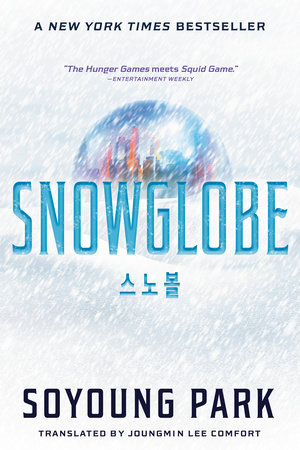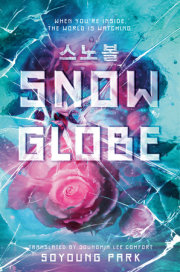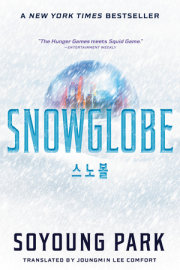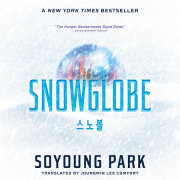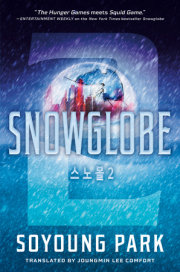The Age of Snowglobe
In the living room, Grandma is sunk in her chair in front of her favorite TV show, a heavy quilt draped over her lap. I look down at the weather ticker scrolling away along the bottom of the screen.
-50°F That’s a three-degree drop from yesterday. A snow-cloud icon trails the temperature, suggesting flurries throughout the day, and Grandma pushes herself out of the chair, shuffling to the electric space heater with the kettle in hand. My brother, Ongi, appears in the living room, wearing his standard morning look: a toothbrush in his mouth and a scowl on his face.
“I wish I were still in school!” he whines, because schools close in temperatures below -50°F.
“Just brush your teeth, please,” I respond flatly, which comes out garbled as I’m still brushing mine, and turn back to the TV. As usual, Grandma has it on Channel 60, the station that airs
Goh Around round the clock.
“No! Hear me out,” Ongi persists, stepping in front of me and ratcheting up the grievance in his voice. “I was sixteen ten months ago when I was in school. I’m still sixteen today, but just because I graduated, I’m now expected to endure this brutal temperature?”
His face is blocking my view of the TV. What does he want me to do about the weather? “Stop spraying toothpaste all over the floor, would you?” I snap, suddenly irritated.
Ongi is my twin brother born exactly ten minutes before me. He likes to pretend to be older and wiser, which is no end of laughable. He should know well by now that I only came second to make sure he got out safely—kind of like a captain being the last one off the ship. I’ve been taking care of him since we shared a womb.
Grandma, back in her sagging chair, swivels her head in our direction. “Ongi, my sweet,” she calls. “Don’t act like a baby in front of your girlfriend.”
Ongi’s eyes bug out, and he races to the kitchen sink, where he spits out the mouthful of foaming toothpaste with extra force.
“Grandma!” he cries. “Jeon Chobahm is
not my girlfriend!”
Grandma has dementia, and she’s been confusing me with my brother’s nonexistent girlfriend for some time now.
I leave Ongi to stew and head back into the bathroom, where I turn on the wall-mounted faucet and fill the tin basin under it. When I scoop up the frigid water and rinse my mouth, the cold sends a shocking jolt through my teeth down to my jawbone, which immediately begins to ache. My hair is next. I’m staring into the basin, steeling myself against the brain-chilling assault to come, when Grandma appears at the door with the kettle in her hand, a plume of steam escaping its spout.
“Watch out, dear,” she says, and stoops to carefully tip the kettle over the basin. “I made this hot water for Ongi, but he wants you to have it instead.”
I watch as she sticks her hand in the basin and swishes the water around to even out the temperature. Over the rising steam, her face is aglow with pride and joy that her grandson grew up to be such a considerate young person—a true gentleman who knows how to care for his girlfriend. Meanwhile, said young man is washing his hair at the kitchen sink, howling as he dips his head under the frigid stream. I can’t help but laugh at his antics as Grandma shuffles back toward the door with the empty kettle.
“Thank you, Grandma,” I say.
She stops in her tracks. Turning around slowly, she searches my face for a long moment with her watery eyes.
“You sound just like my granddaughter,” she says in a voice full of longing. Then she turns back around and heads out the door for her worn chair.
In the mudroom, Ongi and I struggle to pull on our heavy snow boots. It’s made all the more difficult by the layers of insulated clothes—tops, pants, and tights—we have on under our thick snow bibs. Next come out parkas, expedition-weight mittens, and ski masks. Then, finally, the hoods go up, and we’re ready.
“We’re off, Granny! See you later!” Ongi calls toward the living room in his usual upbeat tone.
But as he turns the doorknob, Grandma’s urgent voice stops us short.
“Wait! My goodness, Ongi! Chobahm is on TV!” she cries.
Ongi and I exchange a look as she coos at the TV. “Aww . . . Chobahm! My sweet baby girl.”
I don’t have to look to know that it’s Goh Haeri on the screen. Ongi refuses to acknowledge it, but the beloved actress and I look very much alike. We even share the same birthday, and for what it’s worth, it so happens that we’re both lefties. But no one, except for Grandma, would ever mistake me for her, what with my rough cheeks perpetually inflamed from daily exposure to bone-dry, subzero air, and my coarse hair cropped short for quick washing in frigid water. In contrast, Haeri’s porcelain skin, rosy cheeks, and trademark long, shiny hair radiate her Snowglobe pedigree.
About Snowglobe. With the world now at an average annual temperature of -50°F, Snowglobe is the only place with a temperate climate—the only location with warmth and color—in the whole world. It’s a special settlement that was built atop a geothermal vent and is enclosed in a gigantic weatherproof glass dome. But not just anyone can live there. Its lucky residents are actors, whose unscripted lives are recorded in real time and edited into shows, which are then broadcast to the open world for entertainment. Goh Haeri isn’t just an actress, she’s a megastar, and she’s just been named the new weathercaster—one of the most coveted jobs in Snowglobe. She’ll set the record as the youngest weathercaster in the history of the settlement.
I turn a flat gaze to the TV screen. Dressed in a stylish suit, Haeri looks like she was born to fill the position.
“Hi, it’s Goh Haeri,” she greets the viewers in a buoyant tone. “I’m so excited and honored to be serving our community as the new weathercaster. Make sure to tune in to
News at Nine on New Year’s Day!”
She treats us to her perfect smile, and then the camera cuts away.
I wonder, not for the first time, if I’ll ever be able to meet her in real life. If my hair grew in proportion to my desire for a life in Snowglobe, I could shave my head bare every night and I’d wake up the next day with it sweeping the floor. Sometimes I wonder if my intense longing for the place might be responsible for Grandma confusing me with Haeri—as though she can see my soul yearning to flee this godforsaken icebox in favor of Haeri’s life in Snowglobe.
Ongi turns back to the door, clucking his tongue in distaste.
“What?” I hiss, glowering back at him.
“If only you hadn’t talked so much nonsense about how you might be Goh Haeri’s lost twin and—”
“Stop.” I cut him off with a cuff to the ribs. I can feel the color rising to my face at the memory. “Unless you want to dig your way out of a snowbank!”
But he’s wearing too many layers to be warned off, and he boldly resumes running his mouth. I shove him and he shoves me back, and then we’re snatching at each other and ducking and banging into walls—until we finally end up laughing too hard to keep fighting and we pull ourselves together, then open the door and step outside.
Fifty degrees below zero. The frozen world welcomes us by snatching the breath from our lungs. My nose instantly freezes and stings, and within a few blinks, ice crystals form on my eyelashes and cloud my view.
“It’s so damn cold,” Ongi says with a full-body shudder.
From age six, my twin brother and I accompanied each other to school every day for ten years. Since graduation in February, though, our daily commute has been to the power plant.
I look up at the marbled sky, its gunmetal gray promising a second squall in three days. In the bleak world below, squat log cabins dot the white expanses between tall pines, their branches heavy with snow.
Ongi and I start for the bus stop. Our commute to the power plant could be made on foot, but with a brooding sky like this, the bus is safer. We trudge through the knee-deep snow, and before long, my breath turns my ski mask into an icy mess over my mouth and nose—though better the mask than my face. A few feet ahead, Ongi pauses under a tree and waits for me to catch up.
He can be so sweet, I think. But no sooner do I arrive than he jumps up to a branch to send an avalanche of snow down on my head and shoulders, laughing hysterically.
Seething, I scoop up a handful of snow and pack it into a tight ball. He bolts, shouting, “Race you to the bus stop!”
“Wait!” I shout, already on the move. “Jeon Ongi, you cheater!”
Snow grabs at our boots with each sinking step, rendering our best effort at a dash into more of a lurching shuffle.
“Loser does laundry for a month!” Ongi yells.
“Oh . . . You’re so done, Jeon Ongi!”
I struggle through the clinging trap of snow with everything I have. And when we dive for the bus stop, it’s my hand that touches its bent pole first.
“Ha! Who’s laughing now—” I say victoriously, gasping for breath. Sure, I won by a hair, but a win is a win. I’m bent over with my hands on my knees, catching my breath, when Ongi snatches my arm and jerks me behind him.
Annoyed, I straighten to see him narrowing a hard gaze at a figure ahead.
Just another commuter waiting for the bus, so what about it? is my first thought, but then the person turns in our direction, and when she acknowledges us with an awkward dip of her head, neither Ongi nor I return it.
Copyright © 2024 by Soyoung Park. All rights reserved. No part of this excerpt may be reproduced or reprinted without permission in writing from the publisher.

